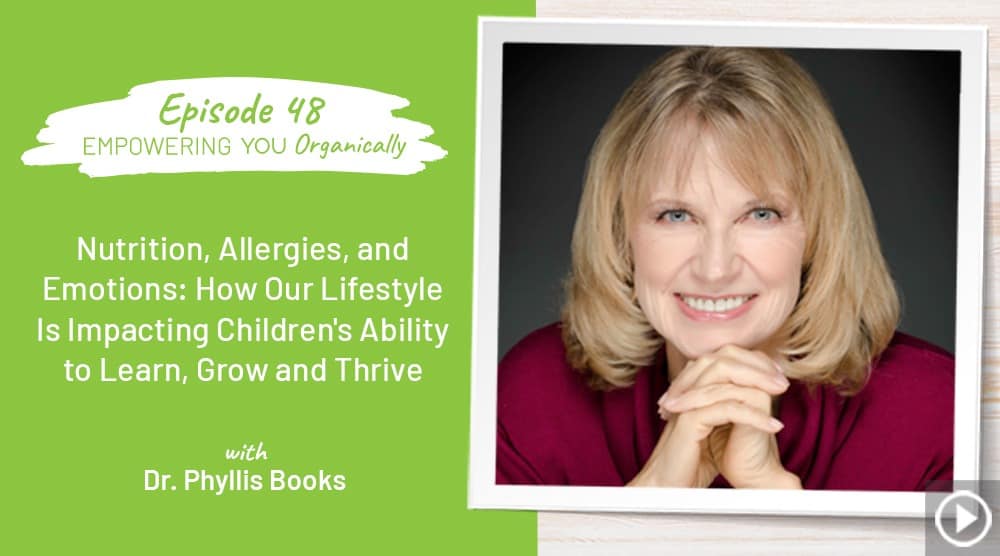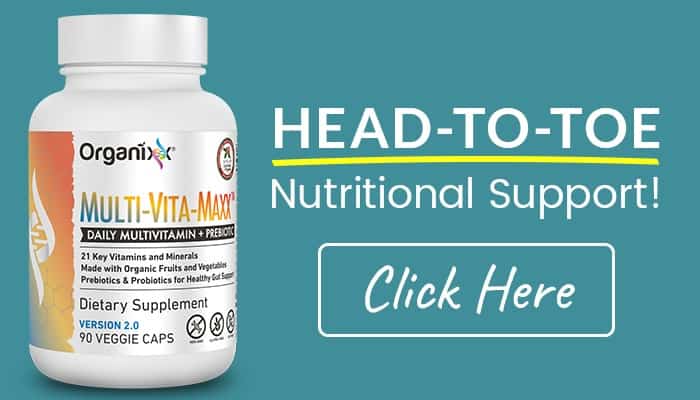Empowering You Organically – Season 7 – Episode 48
Title: Nutrition, Allergies, and Emotions: How Our Lifestyle is Impacting Children’s Ability to Learn, Grow and Thrive
Hosts: Jonathan Hunsaker, TeriAnn Trevenen
Guest: Dr. Phyllis Books
Description: We’ve headed back-to-school and that means managing our nutrition to keep us well-oiled machines! This week Dr. Phyllis Books, author, educator, doctor, and new thought leader educates us on the best way to help our children and ourselves be primed to learn and self-regulate our emotions. Dr. Books works with children and adults to help manage and alleviate dyslexia, ADHD, and allergies in a completely holistic approach with tremendous success. You don’t want to miss this episode!
* * *
About Dr. Books
Dr. Books is an author, educator, doctor, and new thought leader. Working with children, adults, and entrepreneurs, she offers a holistic, narrow science-based approach to reversing dyslexia, ADHD, head traumas, and many chronic issues in as little as five days. She’s been featured in major media outlets, such as Fox News and Los Angeles Times. Dr. Books offers a refreshing solution to conventional treatment workarounds.
Dr. Books’ History and Background
I grew up organically on a dairy farm in Wisconsin. So, I came by the whole thing quite naturally. I grew up learning how the soil affected the nutrients, and how the crops were affected by what was going on in the soil. And then I got into education.
What Dr. Books Does
I work with children who have lots of allergies, or who don’t necessarily have good nutrition.
* * *
Too Much Sugar?
- If you were like a car, and you put sugar in the fuel, you know how that messes up the car? The same things happen with us. When you give a child too much sugar, he or she doesn’t do very well in school, especially not while the sugar is running the system.
- Kids aren’t paying attention
- Brain fog
- Aren’t sleeping well
- One of the common denominators in all of those things is nutrition.
- If you’re eating sugary products, or you have a lot of processed food, or you have allergies, it sets red flags and all the inflammation markers so that children, all of a sudden, can’t learn.
- It’s not that they don’t want to learn, it’s not that it’s impossible for them to learn, the nutrition is really, really affecting their ability to concentrate.
- Dr. Books has her new patients follow a nutritional plan that omits sugar, gluten, and dairy for 6 weeks prior to treatment in her clinic.
What Is Sugar?
- It’s pretty much anything that tastes sweet.
- Dr Books recommends limiting fruit, except low-glycemic berries like raspberries, blueberries, and strawberries, when detoxing you and your family from sugar.
The Positive Effects of Elimination Diet
- For three weeks, if you would cut out wheat, dairy, and sugar, and just watch what happens. And of course, it’s easier if the whole family does it.
- People lose weight
- Brain fog starts disappearing
- A lot of other symptoms that they never associated with food start clearing up
- Kids, it takes two weeks for their taste buds to turn over. And so, if you do three weeks of no sugar, and you’re giving berries and vegetables and healthy things instead, your child’s cravings will totally change in that amount of time as well.
There Are Options for Good Food
- Organic is becoming more and more common
- You can even purchase on Amazon if you don’t have access near your home
Depression and Suicide
- They’re increasing at alarming rates in this country.
Part of it is our toxic world. The pollutants that are in the world, and the chemicals that the children are exposed to, and they don’t know how to get it out. - Our lifestyle has gotten so busy and frantic that kids don’t have down time, they don’t have time to learn to self-regulate and to just learn how to manage themselves.
- The fast answer is to take a drug, or do this or that, instead of lifestyle changes, which means slowing down, paying attention, being present at the meal.
Is Screen Time Down Time?
- When kids get hyper-excited, and they’re in this constant stimulation, it’s not good for them.
- A basic requirement is for every hour you’re on screen time, you spend an hour outside. You spend an hour away from the screen. Because you have to balance it. It doesn’t mean you have to be totally away from it, but you can’t let it run your life, because then they don’t sleep well at night, they don’t rest and restore. It’s almost like they’re in fight or flight, and they don’t have the time to replenish and restore and just breathe.
- For grownups, it’s a way of just zoning out. But for kids, I’m not so sure it actually relaxes them. There’s this blue light in there that actually keeps them in fight or flight. And so, I don’t know that it actually relaxes them. I think it keeps them more stimulated.
“I Could Never Do This”
- My first thing is really educate people about sugar, and then to read the labels.
- They’re (kids) available, not gullible, but they’re open. They want to know. And they notice what makes them feel better and what makes them feel worse. And so, they’re really educatable. More so than parents at some point.
Educating Your Kids
- It’s a good way of teaching, starting to teach chemistry and biochemistry to kids.
- I do summer programs. But some of the time we spend in the kitchen. And it’s “Even though your Mommy and Daddy don’t fix food this way, let me show you.”
- We get out several different brands of nut butters, or different things, so they can try. And then, we’ll make hot chocolate, some with stevia, some with xylitol, and different things, and they get to taste which one. And can they tell a difference? And so on. So, they get to be like scientists. I say, “Your body is a big science experiment.” And actually, they like it.
Allergies
- I use a combination of chiropractic and acupuncture, done by tapping on the body and rubbing, not typical chiropractic and not typical acupuncture.
- The concept is, it’s like there’s a plugged drain, like along the stomach meridian, or the liver meridian. There’s places where it’s clogged. And so, by doing this tapping or rubbing, you can actually go in and clear the channel. And so, when you do that, the interference is removed, and then the body acts as if it’s not having an allergic reaction.
Emotional Connection
So, you weren’t allergic to something, and then one day, you are. Well, what happened? Many times, there was an emotional event or something that happened, and then you ingested the food or the pollen, smelled the pollen or something, and your brain mistakenly puts those two things together.
Advice for People
- I would probably start with the parents in saying, “You have a little being in front of you now, and you want to give them the best life possible, which means you have to come forward with your best self. And that means, for you, paying attention to nutrition as well. Because if you’re not sleeping well, if you’re at the end of the day, and you’re going to sit down and do homework with your child and you’re exhausted yourself, you’re going to end up in fights. So, you need to learn how to do self-care and self-responsibility for yourself, and model that for your children. Model the whole self-care and self-regulation thing for your children.”
- When it comes to the children themselves, I would say to “Make a game of food.”
- Educating them, being a good example and eating your broccoli, and so on.
- Teach them self-care and self-regulation.
- I would say there’s so much help and so much health available. But it means looking in a new direction. If you look in the same old places, you’ll find the same old solutions, which may or may not work. So, again, you’re in charge of your life, and it means don’t ever give up, and just know that there’s hope and there’s help available. And you’re the one in charge of finding it. Just you can’t give up on yourself.
* * *
Subscribe to Empowering You Organically
Never miss an episode!
APPLE PODCASTS SPOTIFY GOOGLE PODCASTS
–
Episode 48 – Nutrition, Allergies, and Emotions: How Our Lifestyle is Impacting Children’s Ability to Learn, Grow and Thrive




